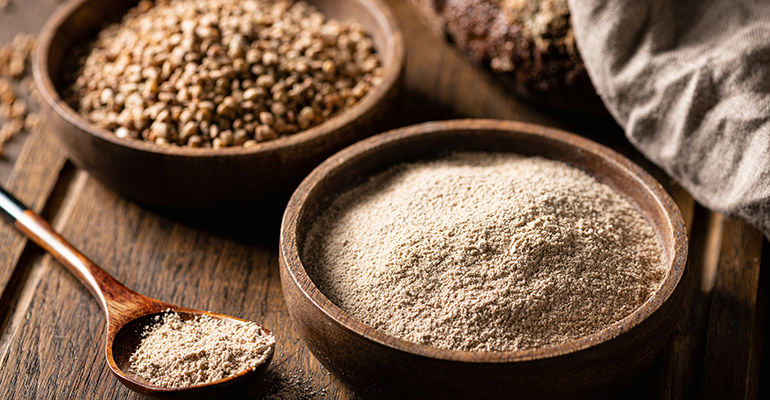Welcome to SJGLE.com! |Register for free|log in
Welcome to SJGLE.com! |Register for free|log in

Related Searches: Tea Vitamin Nutrients Ingredients paper cup packing
Naturally gluten-free, buckwheat contains multiple vitamins and minerals. Buckwheat is richer in minerals than other pseudocereals and cereals, containing minerals including manganese, copper, magnesium, iron and phosphorus. Compared to some seeds and grains, the body can easily absorb minerals found in buckwheat, as they contain low amounts of phytic acid.
Formulators who adopt the ingredient into their product formulations often create gluten‐free products with nutrient‐dense ingredients. They target consumers’ interest in preventing or overcoming various health‐related problems and helping to enhance brain health.
While shoppers understand the importance of nutrition and brain performance, the industry also looks for ingredients with brain health claims backed by research and regulatory approval. Ingredients such as ashwagandha and fibre-rich foods, Mintel states, do have this evidential support and offer gut-brain support to improve mental functioning.
Buckwheat is an ingredient growing in prominence among industry players, trend forecasters and consumers. Subsequently, it is making its way onto manufacturers’ formulation pipelines.
Latvian startup Fermentful launched its plant-based fermented drinks in April 2023, utilising green buckwheat and winning the EIT Foods Marketed Innovation Prize. Operating within the functional beverage segment, the traditional kefir fermented milk drink made from kefir grains uses buckwheat to target mental, physical and environmental health.
“At Fermentful, we firmly believe in harnessing the medicinal potential of food, wher preventive and targeted nutrition can reduce the reliance on medical treatments,” Anda Penka, founder of Fermentful, told Ingredients Network.
“Alarming statistics reveal that a quarter of the EU population experiences depression or anxiety each year, with a substantial portion of major depression left untreated,” Penka says.
“Thankfully, science underscores the strong connection between a healthy gut microbiome, referred to as the gut-brain axis, and our overall physical and mental health,” Penka continues. “We strive to maintain and restore health for a healthier future by offering plant-based, probiotic-rich food as effective nutritional therapy.”
 © AdobeStock/CHZU
© AdobeStock/CHZU
Green Smile is a Ukranian plant-based drink utilising domestic buckwheat as its hero ingredient. Created by the brand, Loostdorf, Green Smile is made with 100% Ukrainian buckwheat and contains five ingredients: buckwheat flour, sunflower oil, carrageenan (red seaweed), water and salt.
Described by New Nutrition Business as the country’s top-selling plant-based milk brand, Green Smile places a bright spotlight on buckwheat as a “superhero cereal”, along with championing its potential to improve brain health, mood and sleep. In its marketing, Green Smile states buckwheat “helps our brain to think, nerves not to strain, and the mood to be always on the positive wave”.
Dubai-based brand Nature’s Own Factory, meanwhile, makes buckwheat tea and chocolate spread. Using Tartary buckwheat seeds, the brand states the ingredient can help enhance cognitive function by improving memory and, as caffeine-free, can normalise sleep and improve overall wellbeing.
Various health-related benefits such as the hypocholesterolemic, hypoglycemic, anticancer and anti‐inflammatory properties link buckwheat and its byproducts to enhance functional food formulation potential, 2021 researchers say.
Formulators supplement buckwheat’s use with cereal crops. Researchers can enhance its nutritive value or replac cereal grains with gluten‐free product formulations, scientists in a 2022 study said.
A 2022 mice study found buckwheat flour and its starch can prevent age-related cognitive decline by increasing the production of the brain-derived neurotrophic factor (BDNF) in the hippocampal part of the body’s limbic system, contributing to sustained neuronal plasticity.
In 2022, researchers stated that grains are a “major source of sustainable protein for health”. Moving the use of grains from feed to traditional foods, plant-based dairy replacement products, and meat analogue foodstuffs may speed up this shift.
Due to its high-protein biological value and nutraceuticals, buckwheat is a prevalent ingredient in ready-to-serve and ready-to-cook foods. “It is imperative to create a cognisance about the cooking methods, nutritional benefits and health implications of buckwheat,” the researchers said.
“We’re definitely interested in identifying a wider range of plant-based crop ingredients,” Sophie Armour, senior communications manager and spokesperson at The Good Food Institute Europe (GFI), told Ingredients Network.
“This can help to build more diversified and therefore less vulnerable supply chains, enable utilisation of locally grown crops–and buckwheat could be one example of many efforts to do that,” Armour adds. “In general, each new crop ingredient for plant-based meat, seafood, eggs and dairy should be evaluated according to their protein content, quality, and function,” Armour continues.
E-newsletter
Tags